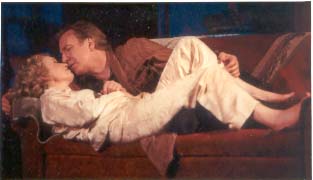
CROYDEN'S CORNER
by Margaret Croyden
 |
| Lindsay Duncan and Alan Rickman in "Private Lives." (Joan Marcus photo) |
Noel Coward's Private Lives --Yet Another Revival
The Richard Rodgers Theater
226 West 46th Street
800-755-4000www.ticketmaster.com
Premiere April 28, 2002
Reviewed May 1, 2002 by Margaret Croyden
Noel Coward's "Private Lives" written in 1930, is now considered a classic example of high comedy and scintillating wit. In 1931 it played on Broadway starring one of the most polished actresses of her time, Gertrude Lawrence, and the playwright himself. When first seen it was thought by some critics to be an empty shell of a play signifying nothing; they may have been right; nevertheless, it has played all over the world attracting the near famous and the famous. Even Richard Burton and Elizabeth Taylor had a try at it. With revivals the main attractions on Broadway these days, "Private Lives" is the newest import from London where it played to sold out audiences and received many awards. Directed once again by Howard Davies, it is presented by no less than eleven producers (too long a list to mentions here) and stars the original British cast, Alan Richman and Lindsay Duncan in the main roles (Elyot and Armanda), and Emma Fielding and Adam Godley as the rejected spouses.
By now everyone who is literate must know the tale of Amanda and Elyot, who, divorced after a tempestuous marriage, find new spouses, only to discover that all of them are staying in the same hotel on their honeymoon night. Meeting on the terrace while their spouses have gone downstairs, Elyot and Armanda realize they are still in love, and, without much hesitation, they run off to Paris together. But after a few days, they revert back to their usual behavior: one moment, blissful; the next, furious, then confrontational and violent. Finally the rejected spouses arrive on the scene to claim their marital partners. Ironically, they begin their own arguments, trade insults, and battle furiously--they are on the way to being lovers--another Elyot and Armanda. Watching this replay, Armanda and Elyot run off again, leaving the other two behind.
Noel Coward despised bourgeois standards of behavior and thought it is perfectly alright for idiosyncratic people to refuse to live by any one else's rules. So it is perfectly OK to hurt and mock the poor fools who are not like them, for they are silly creatures who get what they deserve. But what about the two main characters? Are they silly fools as well, who disguise their basic character by quick and sometimes witty responses that make them appear superior?
Watching this play after all the years is like watching a deadly game of bridge where the couples are petty, stupid, pretentious, and even uninteresting. Of course there is Coward's wit. But if you like humor that expresses hostility, nastiness, arrogance, and sheer malevolence all delivered with perfect timing by the cast, then you will enjoy this dated play. Underneath it all, Coward may have been talking about homosexual behavior. It is no secret that Coward was gay but was never publicly outed (the British arrested homosexuals in those days) so that the private lives Coward may be talking about was his life. But in the year 20002, the subject of the play, or its intention, falls on my deaf ears. There is nothing new here--or even shocking. In an age when movie starts are willing to be stark naked on stage and screen, plays like "Private Lives" are nostalgic but not compelling. And sometimes not even amusing.
The actors work hard and are sometimes impressive. Each one can deliver a perfectly timed laugh line and the attitude that goes with it; each one moves about the stage gracefully and even executes some tricky gymnastics. But Alan Rickman and Lindsay Duncan do not generate any heat between them. Alan Richman, in particular seemed inelegant, overly nasty and not very sexy. His delivery lines are clever and amusing, but as the character madly in love with his former wife, he is unconvincing. Lindsay Duncan is an actress--acting all the time--maybe that's what is wrong with the entire production--one is aware of the actors playing in a Noel Coward play and behaving in the way one expects Noel Coward characters to behave. True, she is exceptionally agile on stage and one of the best moments is the dance that she and Rickman do in the second act which, by the way, is very slow and almost tedious. Tomake matters worse, Ms. Duncan's clothes were unattractive as well as her hairstyle. In the first scene she wears an unbecoming jet black number that resembles a mourning should. (I pictured her in some wonderful white satin art deco gown). She looks better in the next act in her satin pajamas. Ms. Duncan is very professional however and, although she sometimes sounds like a suburban housewife yelling and whining at her husband, she is more suited to the Coward lines then her partner.
Despite these shortcomings the audience took no notice: they seemed to love everything, even the sets (which I thought were hideous). But I wish Broadway would stop with these revivals. Give us something new, for heaven's sake. [Croyden]
Margaret Croyden's most recent book is a memoir "In the Shadow of the
Flame: Three Journeys" (Continuum). A new book "Conversations With
Peter Brook" will be published next year by Farrar, Straus and Giroux.

| museums | NYTW mail | recordings | coupons | publications | classified |